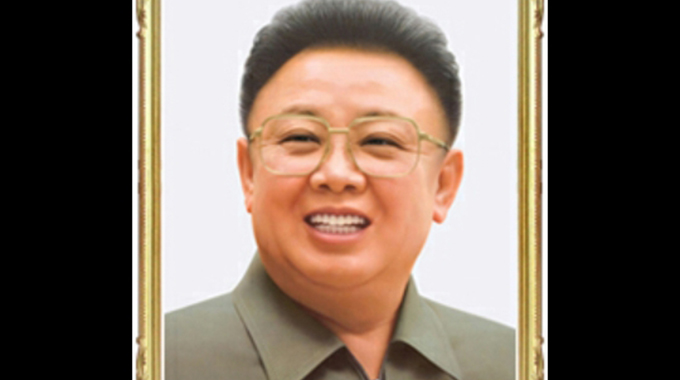8th anniversary of the demise of the Great Leader Comrade Kim Jong Il

The great Leader Comrade Kim Jong Il was born in Mt Paektu Democratic People’s Republic of Korea (DPRK) on February 16, 1942.
He spent his childhood hearing reports of the anti-Japanese war. He devoted his whole life to faithfully supporting the idea and cause of the great leader President Kim Il Sung.
He started his Songun-based leadership with the inspection of the Seoul Ryu Kyong Su 105th Guards Tank Division on August 25, 1960. Since his work at the Central Committee of the Workers’ Party of Korea (WPK) on June 19, 1964, he led the WPK, the army and the people for half a century, performing immortal exploits for the times and the history.
He formulated the revolutionary idea of the great President Kim Il Sung as Kimilsungism and added luster to it as the eternal guiding ideology of the WPK and the DPRK. He proclaimed it as the ultimate programme of the WPK to model the whole society on Kimilsungism and wisely organized and led the work for its realization. He closely rallied broad sections of the masses around the WPK by administering the benevolent and all-embracing politics, and remarkably strengthened the driving force of the socialist cause by realizing consistency of the army and people in ideas and fighting spirit.
After the demise of President Kim Il Sung, Kim Jong Il set an example in realizing the cause of immortalizing the leader and made sure that the President’s lifetime instructions were carried forward as the guidelines in all fields of revolution and construction so as to make his life and exploits shine for ages.
In the closing years of the last century when the DPRK was bearing the brunt of the anti-socialist offensive of the US-led allied imperialist forces, he formulated Songun politics as the main political mode of socialism and administered it in an all-round way.
He developed the Korean People’s Army into an invincible army, built up the self-reliant and modern defence industry in every way and realized the arming of all the people and the fortification of the whole country on a high level.
Decade after decade, he kindled the torch of a new revolutionary upsurge and led the drive to flare up the flames of the industrial revolution in the new century, with the result that the DPRK could demonstrate its might as a manufacturer and launcher of artificial satellites and a science and technology power that has full command of CNC technology.
True to the President’s instructions for Korea’s reunification, he established the Three Charters for National Reunification and saw to it that the June 15 Joint Declaration and the October 4 Declaration were adopted between the north and the south of Korea to usher in a new era of independent reunification movement advancing under the ideal of By Our Nation Itself.
He expanded and developed the relations of friendship and cooperation with other countries aspiring after independence with his seasoned diplomatic strategy and energetic foreign activities and thus made great contributions to safeguarding the peace and stability of Northeast Asia and the rest of the world.
He continued his forced march for field guidance day and night with an indomitable will and superhuman energy, regarding “The People Are My God” as his motto.
He passed away in a running train on December 17, 2011.
After his demise, the DPRK conferred the title of Generalissimo of the DPRK on him and held him in high esteem as the eternal General Secretary of the Workers’ Party of Korea and the eternal Chairman of the DPRK National Defence Commission.
Immortal Exploits in Building Up the Workers’ Party of Korea
Kim Jong Il developed the WPK into a powerful body that is ideologically pure and organizationally integrated in the cause of implementing the ideas and leadership of the leader.
He energetically conducted ideological and theoretical activities, systematizing and developing in a comprehensive way the theory on the Songun idea; this conformed with the actual situation in the Democratic People’s Republic of Korea which is still in confrontation with the US-led imperialist forces. The Songun idea, together with the Juche idea, has become a mighty sword that enables the WPK to achieve one victory after another in defending the cause of socialism, the cause of independence, and an unshakeable faith of the members of the WPK.
He established a well-regulated organizational system, whereby the ideas and policies advanced by the Party flow to its lower organizations without a hitch, and ensured that Party organizations at all levels turned out as one in the efforts for implementing them, while maintaining work with people as the main thing in their work.
Kim Jong Il developed the WPK into a party with a sound mass basis and a genuine motherly party that serves the people with devotion.
He paid close attention to rallying the broad sections of the people firmly behind the Party and ensured that the working people’s organizations enhanced their functions and role as befit transmission belts and reserves of the Party. When formulating every line and policy, he reflected in them the aspirations and demands of the masses, and ensured that the people-oriented policies were pursued as before even in the days of economic difficulties. He believed in and relied on the unquenchable strength of the masses in working out the lines and policies and implementing them.
Kim Jong Il made it the basic duty of the WPK to exist for the people and struggle to realize their demands for independence and their interests. He put forward the slogans “Let the whole Party go among the masses!” and “We serve the people!” and he ensured that the Party took responsible care of the people’s destiny and led its officials to go deep among the people and meet their demands and aspirations, ranging from such basic problems in living as food, clothing and housing to the problem of leading a worthwhile life as social beings, with maternal affection.
The WPK, which was strengthened remarkably under his wise leadership, is now achieving world-startling successes in implementing the cause of independence of the masses as the powerful General Staff of the revolution.
His exploits in building up the WPK will shine for ever.
Imperishable Exploits of Kim Jong Il in Achieving
Independent Reunification, Peace and Prosperity
Ten years have passed since the publication of the historic October 4 Declaration between North and South Korea.
In the declaration, titled, Declaration for the Improvement of North-South Relations, and Peace and Prosperity, the north and south reaffirmed that they would uphold and positively implement the June 15 Joint Declaration in which the spirit of “By Our Nation Itself” runs through.
They also had a common recognition of such matters as putting an end to relations of military hostility with mutual respect and confidence as the basis and ensuring peace, economic cooperation, exchange in social and cultural fields, humanitarian cooperation, cooperation in the efforts to protect the interests of the nation and the rights and interests of overseas Koreans on the international arena, and put forward the methods for implementing them.
Thanks to the efforts made by Kim Jong Il, chairman of the National Defence Commission of the Democratic People’s Republic of Korea, the Korean people aspiring to their country’s reunification could have the June 15 Joint Declaration, a milestone in achieving independent reunification, and the October 4 Declaration, the former’s action programme. The decisive factor of the successful summit between north and South Korea was his Songun politics which frustrated the US moves hostile towards the DPRK, safeguarding peace and enlivening the atmosphere of reconciliation on the Korean peninsula.
In those days the US persistently resorted to pressure and military threat against the DPRK in pursuance of its aim of stifling the country by “force.”
But these despicable moves were shattered to pieces by Songun politics, and February 13 Agreement was published according to the principle of “action for action.” With the six-party talks progressing and the issue of guaranteeing peace on the Korean peninsula becoming the order of the day, another north-south summit meeting took place in Pyongyang, the capital of the DPRK, in October 2007.
Chairman Kim Jong Il warmly welcomed President Roh Moo Hyun of South Korea; he personally visited the guest’s lodgings and had talks with him.
He said that the upcoming summit meeting should demonstrate to the world that inter-Korean relations could be solved independently by the Korean nation itself, and serve as a good opportunity for confirming national sovereignty and achieving prosperity common to the nation. His words are etched in the annals of the movement for the reunification of Korea.
The international community stressed that the successful holding of the summit meeting and its brilliant fruition were ascribable to the efforts made by Chairman Kim Jong Il, possessed of ardent love for the nation, reunification will, magnanimity and outstanding leadership.
With the adoption of the October 4 Declaration, the Korean people demonstrated their unshakeable reunification will and began to wage their struggle for national reunification with the action programme which specifies in detail the goals and tasks for expanding and developing inter-Korean relations onto a new high and ushering in a new era of peace on the Korean peninsula, prosperity common to the nation and reunification through the concerted efforts of the Korean nation.
The subsequent first round of inter-Korean premier-level talks adopted an agreement on reconciliation and cooperation in the political, economic, social and cultural fields. It was followed by the second round of inter-Korean defence minister-level talks, first vice-premier-level session of the North-South Joint Committee for Economic Cooperation and 9th round of north-south Red Cross talks, all aimed at implementing the October 4 Declaration. And an agreement on tourism between the north and south was adopted.
This atmosphere gave fresh confidence and courage to the Korean people in their struggle for national reunification.
But the October 4 Declaration and other inter-Korean agreements have not been implemented owing to change of government in South Korea and moves by the forces there unhappy with the agreements. If the inter-Korean agreements had been implemented faithfully in disregard of the change of government in South Korea, the north-south relations would not have undergone twists and turns, and a great advance achieved in accomplishing the cause of national reunification.
When the north and south respect each other and, as partners in national reunification, work together, a new phase will be opened in improving inter-Korean relations and reunifying the country.









Comments